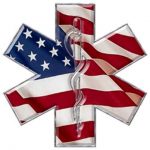 |
A brief history: Ellington Emergency Medical Responders |
| An emergency medical responder is a volunteer community member, firefighter, or police officer that has completed a 54-hour course at a technical college and is trained to provide CPR, first aid skills, and trained in the use of an Automated External Defibrillator (AED).
There are currently 29 groups throughout the Gold Cross service area and each group has a minimum of one AED. Some recieved AED's through a grant Gold Cross was awarded years back and some have purchased their own. Various groups, such as Greenville EMS has gone so far as to purchase enough AED's for each responder. With more than 300 medical responders and 100 paramedics in the Fox Cities, it is important that everyone knows their role, communicates and works together as a team. To ensure that processes works smoothly when on a scene, Gold Cross provides a paramedic liaison to each emergency medical responder group. Samantha Hilker, Paramedic for Gold Cross, has recently taken on the role as Ellington's liaison. In addition, all groups are invited to a quarterly training session sponsored by Gold Cross. |
| In 1979, a group of eight community members in the Town of Ellington completed first aid training so they could become "first responders" on call within their rural community. Bob Bentle was one of those eight becoming involved because his son was born with spina bifida and at that time the on-call ambulance provider's response times were quite lengthy when responding to his rural home.
Almost 30 years later, this volunteer group, now called "Ellington Emergency Medical Responders" is going strong, with four members belonging to the fire department and the other six members being local community members who routinely go above and beyond the call of duty as volunteers. The group, which completes approximately 54 hours of training initially and an additional 30 hours every two years can attest to many successes. They average 45 calls annually, any one of which could involve a lifesaving situation. And that's what makes their role in the emergency medical system so important. |